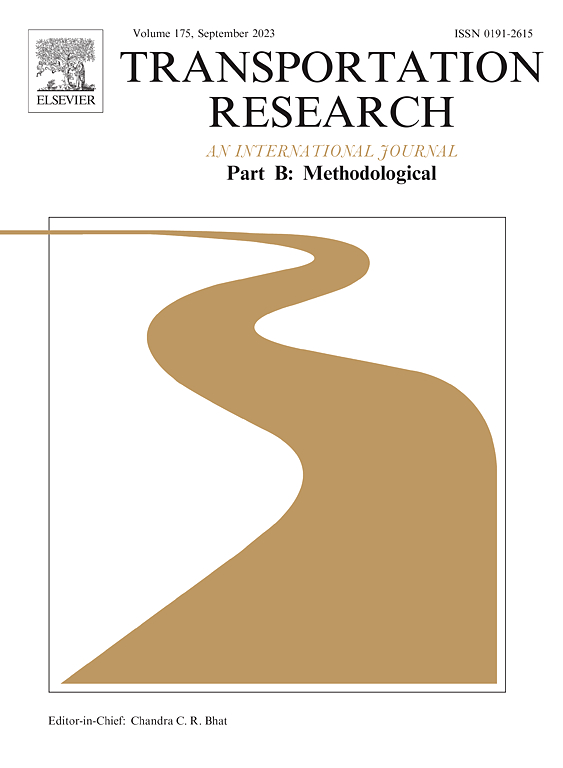一个灵活的非正态随机系数多项概率模型:在发展中经济背景下通勤者模式选择行为研究中的应用
IF 5.8
1区 工程技术
Q1 ECONOMICS
引用次数: 0
摘要
有越来越多的兴趣在协变量上使用非正态参数分布来解释多项选择模型中的随机口味异质性。在这项研究中,我们提出了一个灵活的、计算易于处理的、结构简单的、精简的随机系数多项概率(MNP)模型,该模型可以容纳随机系数中的非正态性。我们提出的方法将正态分布随机系数MNP模型作为一种特殊情况,从而消除了先验地确定每个系数的分布假设的需要。该方法采用隐式高斯copula将单变量系数分布组合成具有灵活依赖结构的多变量分布。本文采用新的灵活MNP框架,研究了印度南部大城市班加罗尔上班族的通勤方式选择行为。分析结果表明,社会人口变量、通勤特征和模式相关属性对通勤模式选择决策有显著影响。重要的是,我们的结果表明,味觉对旅行时间和旅行成本变量的敏感性存在未观察到的异质性;此外,发现旅行时间系数的分布具有显著的非正态分布。在数据拟合方面,我们提出的模型在统计上优于传统的MNP模型以及对旅行时间系数施加正态性的MNP模型。本文还讨论了忽略参数分布的非正态性的缺陷,以及促进从私人交通方式向更可持续的公共交通/步行方式转变的若干政策。本文章由计算机程序翻译,如有差异,请以英文原文为准。
A flexible non-normal random coefficient multinomial probit model: Application to investigating commuter's mode choice behavior in a developing economy context
There is growing interest in employing non-normal parameter distributions on covariates to account for random taste heterogeneity in multinomial choice models. In this study, we propose a flexible, computationally tractable, structurally simple, and parsimonious-in-specification random coefficients multinomial probit (MNP) model that can accommodate non-normality in the random coefficients. Our proposed methodology subsumes the normally distributed random coefficient MNP model as a special case, thus eliminating the need to a priori decide on the distributional assumption for each coefficient. The approach employs an implicit Gaussian copula to combine the univariate coefficient distributions into a multivariate distribution with a flexible dependence structure. Using our new flexible MNP framework, we investigate the commute mode choice behavior for workers in the city of Bengaluru, a metropolitan city in southern India. Results from our analysis indicate that sociodemographic variables, commute characteristics, and mode-related attributes significantly impact the commute mode choice decision. Importantly, our results indicate the presence of unobserved taste heterogeneity in the sensitivities to the travel time and travel cost variables; moreover, the distribution of the travel time coefficient is found to be significantly non-normal. In terms of data fit, our proposed model statistically outperforms the traditional MNP model as well as an MNP model that imposes normality on the travel time coefficient. The pitfalls of ignoring non-normality in the distribution of parameters are also discussed, as are several policies to promote a shift from private modes of transportation to more sustainable public transportation/walk modes.
求助全文
通过发布文献求助,成功后即可免费获取论文全文。
去求助
来源期刊
CiteScore
12.40
自引率
8.80%
发文量
143
审稿时长
14.1 weeks
期刊介绍:
Transportation Research: Part B publishes papers on all methodological aspects of the subject, particularly those that require mathematical analysis. The general theme of the journal is the development and solution of problems that are adequately motivated to deal with important aspects of the design and/or analysis of transportation systems. Areas covered include: traffic flow; design and analysis of transportation networks; control and scheduling; optimization; queuing theory; logistics; supply chains; development and application of statistical, econometric and mathematical models to address transportation problems; cost models; pricing and/or investment; traveler or shipper behavior; cost-benefit methodologies.

 求助内容:
求助内容: 应助结果提醒方式:
应助结果提醒方式:


